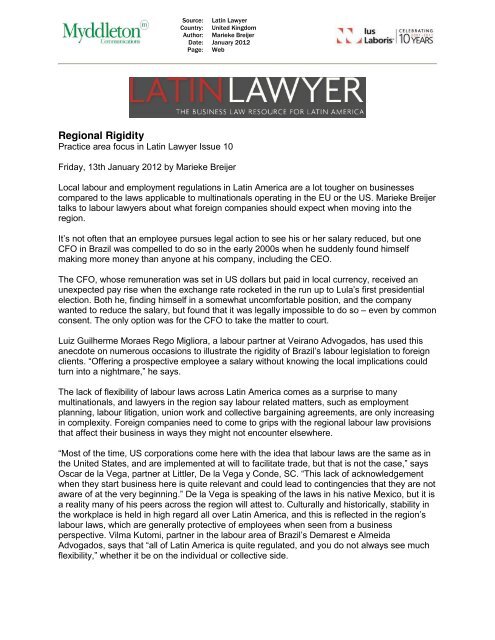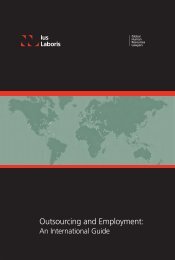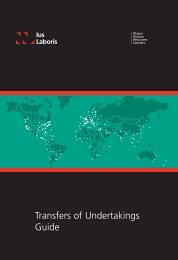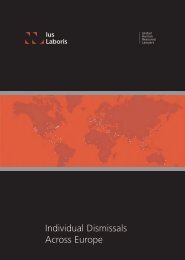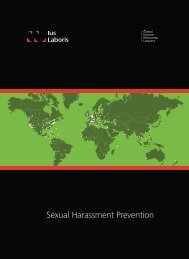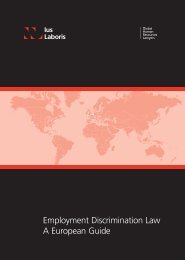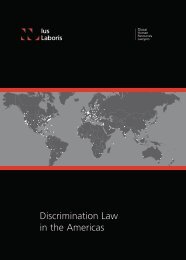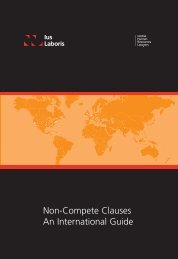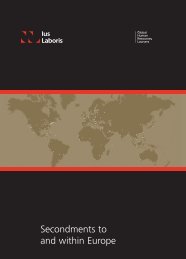Regional Rigidity in Latin America - Ius Laboris
Regional Rigidity in Latin America - Ius Laboris
Regional Rigidity in Latin America - Ius Laboris
You also want an ePaper? Increase the reach of your titles
YUMPU automatically turns print PDFs into web optimized ePapers that Google loves.
Source: Lat<strong>in</strong> Lawyer<br />
Country: United K<strong>in</strong>gdom<br />
Author: Marieke Breijer<br />
Date: January 2012<br />
Page: Web<br />
<strong>Regional</strong> <strong>Rigidity</strong><br />
Practice area focus <strong>in</strong> Lat<strong>in</strong> Lawyer Issue 10<br />
Friday, 13th January 2012 by Marieke Breijer<br />
Local labour and employment regulations <strong>in</strong> Lat<strong>in</strong> <strong>America</strong> are a lot tougher on bus<strong>in</strong>esses<br />
compared to the laws applicable to mult<strong>in</strong>ationals operat<strong>in</strong>g <strong>in</strong> the EU or the US. Marieke Breijer<br />
talks to labour lawyers about what foreign companies should expect when mov<strong>in</strong>g <strong>in</strong>to the<br />
region.<br />
It’s not often that an employee pursues legal action to see his or her salary reduced, but one<br />
CFO <strong>in</strong> Brazil was compelled to do so <strong>in</strong> the early 2000s when he suddenly found himself<br />
mak<strong>in</strong>g more money than anyone at his company, <strong>in</strong>clud<strong>in</strong>g the CEO.<br />
The CFO, whose remuneration was set <strong>in</strong> US dollars but paid <strong>in</strong> local currency, received an<br />
unexpected pay rise when the exchange rate rocketed <strong>in</strong> the run up to Lula’s first presidential<br />
election. Both he, f<strong>in</strong>d<strong>in</strong>g himself <strong>in</strong> a somewhat uncomfortable position, and the company<br />
wanted to reduce the salary, but found that it was legally impossible to do so – even by common<br />
consent. The only option was for the CFO to take the matter to court.<br />
Luiz Guilherme Moraes Rego Migliora, a labour partner at Veirano Advogados, has used this<br />
anecdote on numerous occasions to illustrate the rigidity of Brazil’s labour legislation to foreign<br />
clients. “Offer<strong>in</strong>g a prospective employee a salary without know<strong>in</strong>g the local implications could<br />
turn <strong>in</strong>to a nightmare,” he says.<br />
The lack of flexibility of labour laws across Lat<strong>in</strong> <strong>America</strong> comes as a surprise to many<br />
mult<strong>in</strong>ationals, and lawyers <strong>in</strong> the region say labour related matters, such as employment<br />
plann<strong>in</strong>g, labour litigation, union work and collective barga<strong>in</strong><strong>in</strong>g agreements, are only <strong>in</strong>creas<strong>in</strong>g<br />
<strong>in</strong> complexity. Foreign companies need to come to grips with the regional labour law provisions<br />
that affect their bus<strong>in</strong>ess <strong>in</strong> ways they might not encounter elsewhere.<br />
“Most of the time, US corporations come here with the idea that labour laws are the same as <strong>in</strong><br />
the United States, and are implemented at will to facilitate trade, but that is not the case,” says<br />
Oscar de la Vega, partner at Littler, De la Vega y Conde, SC. “This lack of acknowledgement<br />
when they start bus<strong>in</strong>ess here is quite relevant and could lead to cont<strong>in</strong>gencies that they are not<br />
aware of at the very beg<strong>in</strong>n<strong>in</strong>g.” De la Vega is speak<strong>in</strong>g of the laws <strong>in</strong> his native Mexico, but it is<br />
a reality many of his peers across the region will attest to. Culturally and historically, stability <strong>in</strong><br />
the workplace is held <strong>in</strong> high regard all over Lat<strong>in</strong> <strong>America</strong>, and this is reflected <strong>in</strong> the region’s<br />
labour laws, which are generally protective of employees when seen from a bus<strong>in</strong>ess<br />
perspective. Vilma Kutomi, partner <strong>in</strong> the labour area of Brazil’s Demarest e Almeida<br />
Advogados, says that “all of Lat<strong>in</strong> <strong>America</strong> is quite regulated, and you do not always see much<br />
flexibility,” whether it be on the <strong>in</strong>dividual or collective side.
Source: Lat<strong>in</strong> Lawyer<br />
Country: United K<strong>in</strong>gdom<br />
Author: Marieke Breijer<br />
Date: January 2012<br />
Page: Web<br />
As a result, foreign <strong>in</strong>vestment can be h<strong>in</strong>dered by labour-related dilemmas mult<strong>in</strong>ationals might<br />
not anticipate. Lawyers emphasise that local laws are not to be taken lightly, and warn anyone<br />
who assumes that an <strong>in</strong>ternational bus<strong>in</strong>ess template can automatically be rolled out across<br />
Lat<strong>in</strong> <strong>America</strong>n jurisdictions that such a move could prove to be very costly. They advise<br />
thorough labour and employment plann<strong>in</strong>g to ensure bus<strong>in</strong>ess leaders are aware of the<br />
regulations and can adapt company strategy accord<strong>in</strong>gly. Awareness of the potential pitfalls and<br />
properly mapp<strong>in</strong>g out labour law related expenditures are thus essential to sett<strong>in</strong>g up shop<br />
successfully.<br />
Expensive surprises<br />
Pitfalls and costs lie <strong>in</strong> wait <strong>in</strong> many aspects of labour legislation, and each country has its own<br />
versions. Take remuneration plans <strong>in</strong> Lat<strong>in</strong> <strong>America</strong>, which can differ quite considerably from<br />
the templates mult<strong>in</strong>ationals work with and are therefore an important consideration when<br />
aim<strong>in</strong>g for future cost-effectiveness. In many countries the right to bonuses on top of the basic<br />
salary – whether it be a 13th month of pay, holiday pay or a Christmas bonus – is governed by<br />
national law, and therefore mandatory and unavoidable. “We have extra bonuses <strong>in</strong> July and<br />
December and other legal benefits, and companies have to understand that all have to be<br />
complied with, and all add cost,” says José Antonio Valdez of Peru’s Estudio Olaechea. Such<br />
rules may <strong>in</strong>terfere with company policies stipulat<strong>in</strong>g performance-based bonus systems, for<br />
example. That is not to say a company cannot still give other bonuses to its star performers, as<br />
long as it is aware of the potential drawbacks <strong>in</strong> do<strong>in</strong>g so. Marco Durante of BDS Asesores<br />
expla<strong>in</strong>s that <strong>in</strong> Costa Rica, all bonuses are considered part of the employee’s salary, and the<br />
company has to make contributions towards social security based on that salary. “Add all that<br />
up and it is actually quite expensive to hire people,” he says. In Venezuela, already a risky<br />
market for foreign companies because of the government’s socialist stance and somewhat<br />
unpredictable behaviour, lawyers are expect<strong>in</strong>g amendments to the labour law, which will most<br />
likely make operations for mult<strong>in</strong>ationals even more expensive <strong>in</strong> the future. “We have been<br />
wait<strong>in</strong>g for this amendment for years, but everyth<strong>in</strong>g is <strong>in</strong> the hands of the president [Hugo<br />
Chávez]. He is the one to say what is go<strong>in</strong>g to happen, there will most likely not be a national<br />
discussion about it, which is very troublesome,” says Oscar Torres, of Venezuela’s Travieso<br />
Evans Arria Rengel & Paz.<br />
“One th<strong>in</strong>g we do a lot is ask the company up front how much money they are will<strong>in</strong>g to spend<br />
on one employee, we can then tell him what to offer the employee per month,” says Veirano<br />
Advogados’ Migliora. In Argent<strong>in</strong>a, long-term salary plann<strong>in</strong>g is made difficult as employees are<br />
entitled to higher salaries <strong>in</strong> relation to the country’s <strong>in</strong>flation rates, says Marval, O’Farrell &<br />
Mairal partner Enrique Stile. “If yearly <strong>in</strong>flation stands at 30 per cent, it is very difficult for<br />
companies to raise salaries with that same percentage,” he says, and, unfortunately for<br />
employers <strong>in</strong> the country, it is actually a very plausible scenario: the annual <strong>in</strong>flation rate stood<br />
at around 24 per cent <strong>in</strong> early December. (Though Argent<strong>in</strong>a’s national statistics agency,<br />
INDEC, reports much lower <strong>in</strong>flation, some economists believe the agency under-reports actual<br />
rates for political ga<strong>in</strong> and to trim debt payments, which, like salaries, are <strong>in</strong>dexed to <strong>in</strong>flation.)<br />
On top of the obligatory wage <strong>in</strong>creases, companies <strong>in</strong> Argent<strong>in</strong>a face another challenge when it<br />
comes to employee retention. Stile expla<strong>in</strong>s: “With the high <strong>in</strong>flation rates, it is really difficult to<br />
keep employees happy. If competitors then offer just a little bit more, they change.” These<br />
practices have huge consequences for a company’s competitiveness, says Eduardo V<strong>in</strong>ales, of<br />
Argent<strong>in</strong>a’s Funes de Rioja Abogados, advocat<strong>in</strong>g for a more <strong>in</strong>telligent collective barga<strong>in</strong><strong>in</strong>g<br />
process when it comes to salaries.
Source: Lat<strong>in</strong> Lawyer<br />
Country: United K<strong>in</strong>gdom<br />
Author: Marieke Breijer<br />
Date: January 2012<br />
Page: Web<br />
<strong>Rigidity</strong> <strong>in</strong> personnel contracts extends to the hours the employee is hired for. In another clash<br />
between bus<strong>in</strong>ess cultures, regular shifts are the norm <strong>in</strong> Lat<strong>in</strong> <strong>America</strong> while overtime is strictly<br />
controlled. Enrique Munita, partner at Philippi, Yrarrázaval, Pulido & Brunner <strong>in</strong> Chile, tells of the<br />
complications that arose when a client <strong>in</strong> the fast food bus<strong>in</strong>ess realised Chilean law would not<br />
allow it to impose flexible work<strong>in</strong>g shifts on its employees. Partner Enrique Uribe of Chile’s<br />
Uribe, Hübner & Canales Abogados presents the same view: “A very important difference with<br />
US law is that you have to have fixed schedules. I know a mult<strong>in</strong>ational that <strong>in</strong> the US has a<br />
weekly schedule where they can move the worker from one schedule to another to adapt<br />
themselves to a specific week. Here <strong>in</strong> Chile it is more difficult to move the shifts.” When the<br />
authorities f<strong>in</strong>d that rules are be<strong>in</strong>g broken, f<strong>in</strong>es are imposed. Though the penalties are not<br />
very high <strong>in</strong> general, an employer can be f<strong>in</strong>ed “as much as is needed to conv<strong>in</strong>ce the company<br />
to modify the policies,” Munita says.<br />
Before hir<strong>in</strong>g takes place, mult<strong>in</strong>ationals also need to take <strong>in</strong>to account that certa<strong>in</strong> clauses<br />
<strong>in</strong>corporated <strong>in</strong> contracts might not be legal <strong>in</strong> other jurisdictions, says Juliana Giraldo, an<br />
associate at Colombia’s Brigard & Urrutia Abogados. Though fairly standard <strong>in</strong> today’s bus<strong>in</strong>ess<br />
environment, she says that non-compete, non-solicitation and confidentiality clauses are not<br />
enforceable <strong>in</strong> the country because they <strong>in</strong>terfere with <strong>in</strong>dividual labour rights, which make it<br />
easier for employees to leave a job without cost to themselves. If an employee is fired by a<br />
company, however, he or she is most likely entitled to a severance fee, which <strong>in</strong>cludes<br />
proportional parts of any outstand<strong>in</strong>g bonuses, and other costs. And even then, it cannot be<br />
guaranteed that the employee will not try to seek a larger payout, or ask to be reemployed<br />
through the courts.<br />
Further complications can arise when employers want to move employees between countries,<br />
which is a run-of- the-mill practice with<strong>in</strong> the Central <strong>America</strong>n countries, for example. “[Costa<br />
Rica] is a small market, and it is common for employees and expats to travel to other countries,<br />
but the labour laws are all different, and that poses a challenge for companies’ <strong>in</strong>ternal policies,”<br />
says BDS Asesores partner Francisco Salas. “The question is which legislation to look at when<br />
term<strong>in</strong>at<strong>in</strong>g the employee,” says Durante. “In Costa Rica we do not have legislation to regulate<br />
employees that work <strong>in</strong> multiple countries,” he says, add<strong>in</strong>g that there are no coord<strong>in</strong>ated legal<br />
systems for matters such as pensions and benefits, or for dismissals. When a company wants<br />
to term<strong>in</strong>ate contracts, they usually do not have <strong>in</strong>ternal policies <strong>in</strong> place to deal with the matter.<br />
“When people f<strong>in</strong>d themselves term<strong>in</strong>ated with the worst legislation of all, they go to the courts,<br />
but the judges do not have a clear view on it either,” Durante says.<br />
BDS Asesores is a member of global labour law network <strong>Ius</strong> <strong>Laboris</strong>, which facilitates the<br />
discussion of such differences <strong>in</strong> labour legislation. The network <strong>in</strong>cludes other firms mentioned<br />
<strong>in</strong> this article, <strong>in</strong>clud<strong>in</strong>g Funes de Rioja, Veirano Advogado, Philippi Yrarrázaval, Brigard &<br />
Urrutia and Estudio Olaechea. At the time of writ<strong>in</strong>g the Mexican member was Basham, R<strong>in</strong>ge y<br />
Correa SC, although s<strong>in</strong>ce then Oscar de la Vega has left with his labour team to found a new<br />
firm so the membership may change.<br />
To the courts<br />
Compared to the US, litigation related to dismissal is a regular occurrence <strong>in</strong> Lat<strong>in</strong> <strong>America</strong>. “It is<br />
a shock to mult<strong>in</strong>ationals when their employee challenges the term<strong>in</strong>ation process, they th<strong>in</strong>k<br />
they can term<strong>in</strong>ate them at will,” says de la Vega. He adds that, <strong>in</strong> Mexico, an employee is<br />
entitled to all unpaid salary – without a cap – while the case is be<strong>in</strong>g heard, result<strong>in</strong>g <strong>in</strong> liabilities
Source: Lat<strong>in</strong> Lawyer<br />
Country: United K<strong>in</strong>gdom<br />
Author: Marieke Breijer<br />
Date: January 2012<br />
Page: Web<br />
unheard of <strong>in</strong> other jurisdictions. “It massively <strong>in</strong>creases the cost of the total operation, and one<br />
case alone could ru<strong>in</strong> a small corporation,” de la Vega says.<br />
Second to dismissal are cases related to overtime, while the breach of fundamental rights such<br />
as health and non-discrim<strong>in</strong>ation are also on the rise across the region. “Employees can give<br />
notice to a company to have rights respected, and if the situation doesn’t change, they can get<br />
money from the employer through the courts,” says BDS Asesores’ Durante of the situation <strong>in</strong><br />
Central <strong>America</strong>. In Colombia, Brigard & Urrutia partner Alvaro Cala is <strong>in</strong>terested to see how an<br />
anti-harassment and anti-discrim<strong>in</strong>ation law passed some six years ago will br<strong>in</strong>g about further<br />
changes <strong>in</strong> the litigation landscape, as it has led to a mix of the crim<strong>in</strong>al and labour practices.<br />
The Central <strong>America</strong>n countries and Brazil are examples of where tak<strong>in</strong>g court action is easier<br />
for the employee, as it is free for a pla<strong>in</strong>tiff to br<strong>in</strong>g a case to the courts. “It is quite easy for<br />
employees to br<strong>in</strong>g cases where they feel they’ve been wronged,” says Veirano’s Migliora of the<br />
situation <strong>in</strong> Brazil, add<strong>in</strong>g that employees are at a relatively advantageous position cost-wise<br />
because their lawyers tend to operate on the basis of a success fee. “For the prospective<br />
pla<strong>in</strong>tiff it is basically a lottery where there is noth<strong>in</strong>g to lose, as such the country knows a high<br />
number of <strong>in</strong>dividual actions,” he says.<br />
In most cases, the associated risk of go<strong>in</strong>g to the courts is a lot higher for the employer. “You<br />
have to pay the lawyers, experts, <strong>in</strong>volve managers <strong>in</strong> hear<strong>in</strong>gs, all of which cost you time and<br />
money, which isn’t good for the balance sheets,” says Marval’s Stile of the situation <strong>in</strong><br />
Argent<strong>in</strong>a.<br />
In Peru, dismissed <strong>in</strong>dividuals can even use the court system to be re<strong>in</strong>stated as an employee<br />
by means of constitutional action. Employees can only be let go if they are found to be at fault,<br />
which is why employers prefer to hire people on a temporary basis. However, if this is done<br />
through the <strong>in</strong>correct form of contract, the court will rule it is <strong>in</strong> fact an <strong>in</strong>determ<strong>in</strong>ate labour<br />
agreement and the employee will be allowed to go back to work. The difficulty relat<strong>in</strong>g to<br />
term<strong>in</strong>ation of employment is “a hot topic <strong>in</strong> Peru,” says Olaechea’s Valdez, and most of the<br />
time, the companies prefer to settle for a higher payout with the employee than cont<strong>in</strong>ue the<br />
court procedures.<br />
All activity suspended<br />
Last November, workers at Campo Rubiales succeeded <strong>in</strong> suspend<strong>in</strong>g operations at what is the<br />
country’s largest oil field through strike action. Demand<strong>in</strong>g better labour relations and job<br />
security, workers compla<strong>in</strong>ed of be<strong>in</strong>g hired on temporary contracts through <strong>in</strong>termediaries, and<br />
be<strong>in</strong>g denied the social benefits associated with full-time employment.<br />
In the same month, Petrobras workers were close to a walkout over demands for better wages<br />
and benefits from the state-owned heavyweight. Contemplat<strong>in</strong>g the potentially massive cost of<br />
an all-out strike, the company did not waste any time and started negotiat<strong>in</strong>g with the Brazilian<br />
Oil Workers Federation (FUP), an umbrella organisation that represents some 60,000 of<br />
Petrobras’s 75,000 employees, and managed to avert crisis by reach<strong>in</strong>g an agreement that<br />
satisfied the union leaders.<br />
Only a day before Petrobras employees called off their strike, activity at Brazil’s Santos port was<br />
stopped <strong>in</strong> a 24-hour surprise action. Barr<strong>in</strong>g ships from enter<strong>in</strong>g or leav<strong>in</strong>g the port, the walkout<br />
was meant to warn port authorities of the possible consequences to the country’s export
Source: Lat<strong>in</strong> Lawyer<br />
Country: United K<strong>in</strong>gdom<br />
Author: Marieke Breijer<br />
Date: January 2012<br />
Page: Web<br />
<strong>in</strong>dustry if there were a general strike. A month before that, bank employees <strong>in</strong> the country left<br />
their jobs for two consecutive weeks. Similarly, Argent<strong>in</strong>a’s oil and gas <strong>in</strong>dustry has seen strikes<br />
throughout the year while actions <strong>in</strong> the m<strong>in</strong><strong>in</strong>g sector have halted production <strong>in</strong> Peru, Chile and<br />
Bolivia. Clearly <strong>in</strong>dustrial action can be a huge problem for companies. Fuelled either by ris<strong>in</strong>g<br />
<strong>in</strong>flation and <strong>in</strong>creased liv<strong>in</strong>g costs or the need for better social benefits or improved safety<br />
standards, there are many different reasons why workers take action. Used widely and<br />
frequently, strikes are a strong barga<strong>in</strong><strong>in</strong>g tool for employees. Especially <strong>in</strong> the natural<br />
resources sector, strikes can represent losses of millions of dollars a day, and if a company<br />
does not fulfil its contractual obligations it could lose its concessions.<br />
The roles of unions <strong>in</strong> these actions can differ greatly between and even with<strong>in</strong> countries. In<br />
Brazil, for example, unions tend to be stronger <strong>in</strong> the <strong>in</strong>dustrialised areas, mak<strong>in</strong>g geographical<br />
placement of a plant a very important consideration for companies wish<strong>in</strong>g to keep union<br />
matters to a m<strong>in</strong>imum. In Peru union activity is very low, and collective barga<strong>in</strong><strong>in</strong>g only exists <strong>in</strong><br />
the port and construction sectors, whereas <strong>in</strong> Chile the collective barga<strong>in</strong><strong>in</strong>g system allows<br />
unions to negotiate with<strong>in</strong> a company, but not sector-wide, unless the employers agree, says<br />
Uribe. The unions <strong>in</strong> Venezuela are very strong, and employ radical tactics to stop company<br />
operations, says Travieso Evans’ Torres, add<strong>in</strong>g that workers are known to occupy companies<br />
when they do not agree with the terms of a collective barga<strong>in</strong><strong>in</strong>g agreement they had agreed<br />
with <strong>in</strong> the past. “It is very hard to solve an issue like this, as the government does not do<br />
anyth<strong>in</strong>g about it and th<strong>in</strong>gs can get quite extreme,” Torres says. Argent<strong>in</strong>a is another special<br />
matter, as unions – organised by sector of activity – not only fight on behalf of employees, but<br />
also among themselves to represent a larger proportion of the work force, and use relatively<br />
aggressive methods to get their way. A prom<strong>in</strong>ent problem at the moment is the truckers’ union,<br />
which argues that all truck drivers should be part of their union, even if the core bus<strong>in</strong>ess of the<br />
company is not related. “The truck union starts picket<strong>in</strong>g the company and does not allow you to<br />
sell, which makes the companies lose clients and money,” says Stile. This activity has the<br />
potential to create further problems <strong>in</strong>ternally when company employees accept the truckers’<br />
strikes because it will eventually be more beneficial for them to do so. Besides the truckers’<br />
union, Stile says the activity is also common <strong>in</strong> the oil and gas, and m<strong>in</strong><strong>in</strong>g sectors because “the<br />
activity is boom<strong>in</strong>g, and the losses of the company are much higher than the salary <strong>in</strong>crease,<br />
which gives the unions a lot of power.”<br />
Overall, lawyers argue that more flexibility <strong>in</strong> labour law could help prevent some of the issues<br />
mult<strong>in</strong>ationals are faced with today and help simplify labour relations on a cont<strong>in</strong>ent whose<br />
economies have steadily opened up to facilitate trade <strong>in</strong> the <strong>in</strong>ternational markets, but where<br />
labour laws, for a variety of reasons, are relatively conservative. “Our labour law is very<br />
complex, very protective and very old,” says BDS Asesores’ Durante, admitt<strong>in</strong>g that he’d like to<br />
change “so many th<strong>in</strong>gs” <strong>in</strong> Costa Rica.<br />
“We need more flexibility regard<strong>in</strong>g dismissal, as well as for work<strong>in</strong>g hours,” says Philippi’s<br />
Munita of what he would change if he had the chance. Littler’s de la Vega however, says that<br />
while Mexico should really consider updat<strong>in</strong>g its labour laws to be more competitive <strong>in</strong> the global<br />
arena, at the same time companies should learn that hav<strong>in</strong>g a similar system as the US is<br />
simply not possible, and he cont<strong>in</strong>ues to stress that they should <strong>in</strong>stead prepare themselves<br />
properly <strong>in</strong> advance to prevent any liabilities. These sentiments are echoed by Durante, who<br />
says that while the Central <strong>America</strong>n countries develop their labour laws, foreign companies<br />
need to understand that labour systems <strong>in</strong> Central <strong>America</strong> are not as mature as <strong>in</strong> the EU or<br />
the US, and would be better off if they developed <strong>in</strong>ternal policies to overcome associated<br />
challenges.
Source: Lat<strong>in</strong> Lawyer<br />
Country: United K<strong>in</strong>gdom<br />
Author: Marieke Breijer<br />
Date: January 2012<br />
Page: Web<br />
Though labour laws are meant to promote and preserve stability <strong>in</strong> the workplace, Marval’s Stile<br />
feels that <strong>in</strong> Argent<strong>in</strong>a, conflict is <strong>in</strong>creas<strong>in</strong>g every day. “Our government is very pro union and<br />
very pro employee, which leads to a lot of conflicts and lawsuits, as the labour laws allow<br />
employees to f<strong>in</strong>d many ways of mak<strong>in</strong>g money. “Employees need protection, but that should<br />
not prevent a bus<strong>in</strong>essman from do<strong>in</strong>g bus<strong>in</strong>ess. We need to f<strong>in</strong>d an equilibrium,” he says.<br />
History has shown, however, that chang<strong>in</strong>g legislation is not the easiest of th<strong>in</strong>gs. Veirano’s<br />
Migliora says reform of Brazil’s labour laws has been on the agenda for years, but that “it is a<br />
very delicate issue and the government has not found a way to deal with it” add<strong>in</strong>g that it is<br />
constantly fac<strong>in</strong>g pressure from unions and bus<strong>in</strong>ess sectors alike. In Peru, a new labour code<br />
has just been presented to the government, but Olaechea’s Valdez emphasises that it took 10<br />
years of negotiations between employers and employees to get to that stage. Now, a special<br />
commission will review the project before the code can be enacted. Other countries, like Chile,<br />
have gone through changes <strong>in</strong> recent years, but Munita says he hopes that “for the health of the<br />
country,” there will be a bigger discussion on labour law <strong>in</strong> the future.<br />
On the plus side, it seems that despite the legal woes, the advantages of participat<strong>in</strong>g <strong>in</strong> Lat<strong>in</strong><br />
<strong>America</strong>’s economies still outweigh the hidden snags <strong>in</strong> their labour laws, as lawyers say the<br />
volume of work is higher than ever before. Work<strong>in</strong>g <strong>in</strong> what is arguably the most highly<br />
regulated country <strong>in</strong> the region, Migliora says that he is yet to see a client that wanted to do<br />
bus<strong>in</strong>ess <strong>in</strong> Brazil and then pulled out after encounter<strong>in</strong>g these obstacles; they prefer to follow<br />
the pathway taken by other companies <strong>in</strong> the past. “What clients are try<strong>in</strong>g to do is get to grips<br />
with the law and become properly structured. When they look around and see that several other<br />
bus<strong>in</strong>esses have been successful here, Brazil suddenly becomes a number one market. It is<br />
merely a question of adapt<strong>in</strong>g to the labour legislation, same as with tax laws. But if you get the<br />
right k<strong>in</strong>d of advice <strong>in</strong> advance – and there are good lawyers around – then it is <strong>in</strong> fact no big<br />
deal. Labour issues are not a deal breaker, as long as you do your homework upfront and know<br />
what the challenges are.”


